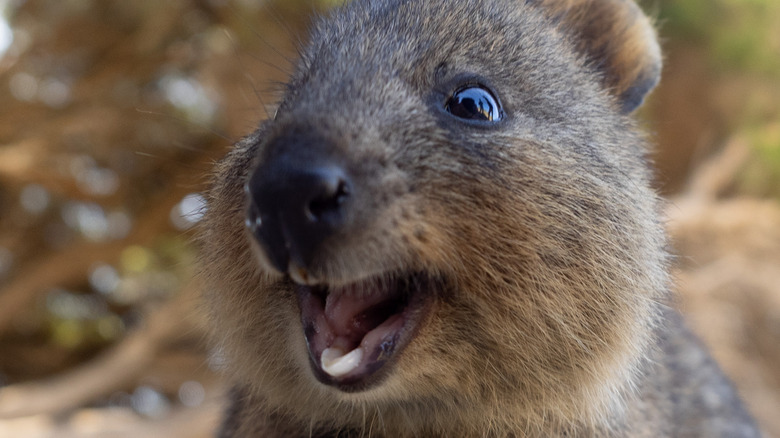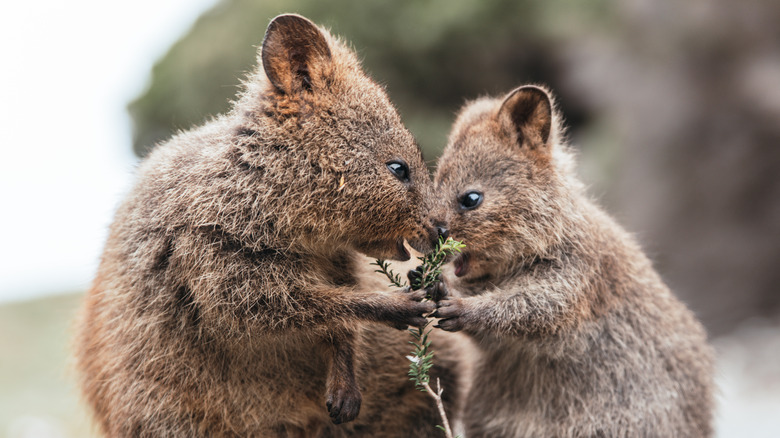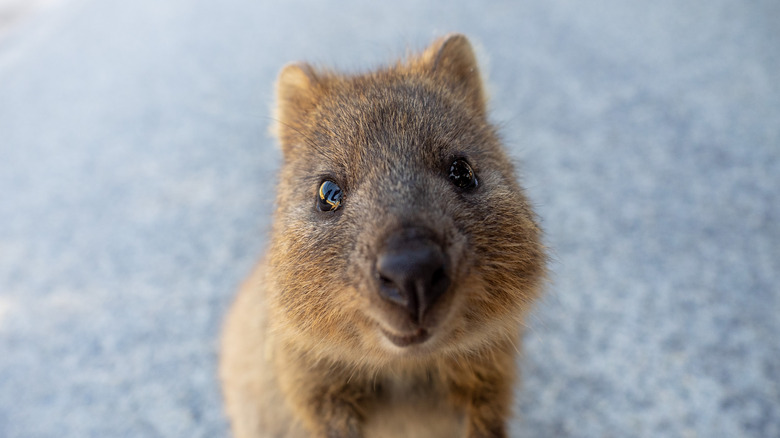Why The 'World's Happiest Animal' Is In Danger Of Going Extinct
What's the happiest animal on the planet? You might think it's the laughing kookaburra, or perhaps the equally-laughing hyena. The thing is, though, these creatures aren't actually laughing in the sense that humans laugh. In fact, per NPR, a spotted hyena's laugh tends to be an indicator of stress or aggression. Michigan State University's Sarah Benson-Abram, after a long period of observing them in their natural habitat, concluded, "they're usually pretty stressed out. Often they giggle once they've been attacked."
To inject a little positivity into this often-gloomy world, perhaps it's we humans who are the happiest creatures in the world. We laugh, we joke, we dance, we seek companionship and time to indulge in our favorite pastimes wherever we can.
All of this aside, though, the popularly-accepted Happiest Animal is a close relative of the kangaroo. Tragically, the species is in danger of going extinct, and, perhaps unusually, we humans haven't been the only factor in that sad state of affairs.
Why is the cute quokka disappearing?
The quokka, Britannica reports, is a member of the wallaby family. This adorable creature, also known as the short-tailed scrub wallaby, gained a sort of viral status on the Internet in recent years, owing to its uncanny trait of looking like it's smiling while seeming to pose in the cutest ways. Their size probably helps, too; they only get up to about 21 inches tall and weigh less than 11 pounds (per San Diego Zoo).
Naturally, this has made the quokka a popular partner for tourist selfies. Per Rottnest Island Wildlife, it is the only native species of said island, which is, per Rottnest Island, situated in Western Australia. As the website reports, Rottnest is home to the largest population of quokkas, and while they're a major draw to the island, their great numbers and appeal easily led to encounters with humans. Humans who should, reportedly, leave the nocturnal creatures alone, not feed or approach them, and instead observe and admire from a distance.
Regardless of how strictly these rules of quokka-respect have been adhered to, the precious creatures' numbers have been declining. According to scientists, other species are to blame.
An uncertain future for the world's wonderful wildlife
In February 2020, E. J. Scholtz and L.R.G. DeSantis published the study "Invasive species, not environmental changes, restrict the population and geographical range of the quokka (Setonix brachyurus)." The research (via the Journal of Zoology) tackles the introduction of European species, such as goats and the European red fox, and how quokka habitats and dietary habits changed in response.
The quokka, according to the study's abstract, had a limited Western Australian habitat before the arrival of invasive species from Europe, and continues to. Certain things have changed, though: "There is ... an apparent shift in the feeding environment of the quokkas on mainland Australia, from more open forests/shrublands in the Pleistocene to denser and wetter forests." On top of this, where they do not share a habitat with invasive species, their diets largely consist of "drier and tougher foods."
The conclusion, according to the researchers, is that "the restricted range of the quokka today is most likely a result of predation from non-native taxa and/or other human influences — not because of a lack of suitable habitat."
Vanderbilt University, where the researchers hail from, goes on to explain that the numerous quokkas on Rottnest Island are safe from foxes, which aren't found there. Nevertheless, a lack of water kills many of them there. Factors such as these, sadly, will only worsen as temperatures rise. As DeSantis put it, "We are essentially playing roulette with native species in Australia."


